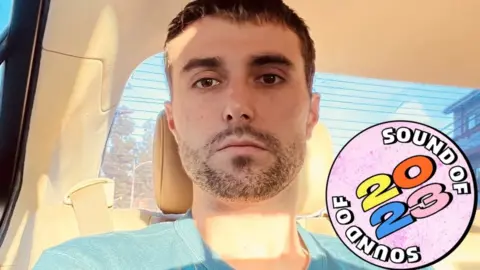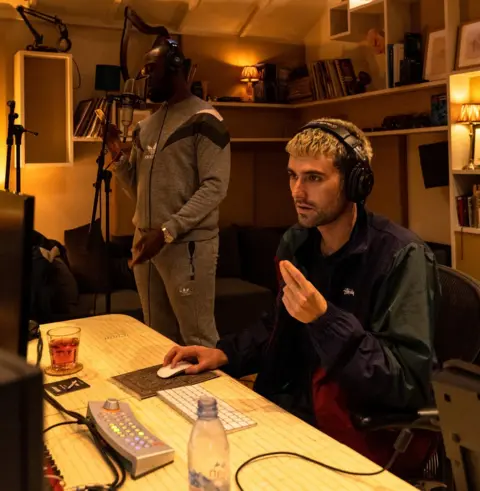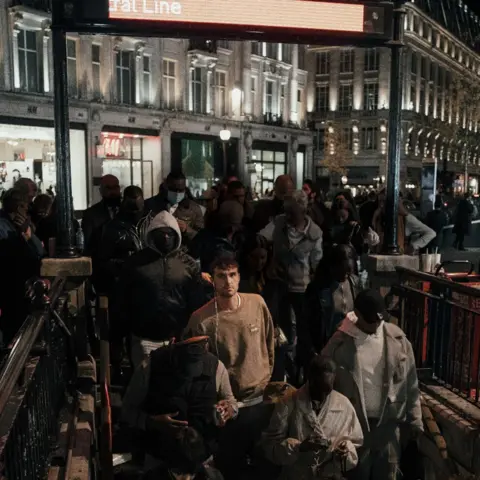Sound Of 2023: Fred Again's emotive electronica earns second place
 Atlantic Records
Atlantic RecordsFred Gibson, aka house musician Fred Again, is one of the best-connected people in the music industry.
Mentored by Brian Eno as a teenager, he made his name as a writer-producer on hits like George Ezra's Shotgun, Ed Sheeran's Bad Habits, Stormzy's Own It and Charli XCX's After The Afterparty.
In 2020, the Brits named him producer of the year. At 26, he was the youngest-ever person to receive the award.
Around the same time, he struck out as a solo artist, releasing a trilogy of albums that blended house beats with everyday sounds and conversations he collected on his phone.
While most dance music is framed as escapism, his songs are intimate and heartfelt. The first volume of his Actual Life series was inspired by a friend who became ill and passed away; and the second is about coming to terms with that pain.
The third, which sees his world opening up again post-pandemic, entered the UK album charts at number four in October.
"For me, the narrative arc of the albums is probably a sort of changing relationship with grief," he says. "But it's become lots of different things to different people. Which is obviously a beautiful thing."
Allow Google YouTube content?
The impact of those records has earned Fred Again second place in the BBC's Sound Of 2023 - with experts like Dua Lipa, Pete Tong, Sam Smith and Emily Eavis all tipping him for mainstream success next year.
He joins electronic artist Nia Archives, soul band Gabriels and singer-songwriter Cat Burns in the top five, with the winner to be revealed on BBC Radio 1 on Thursday.

The Sound Of 2023... so far

Gibson was born and raised in Balham, south London, and showed an aptitude for music early on, learning piano and tuned percussion instruments like the marimba and xylophone before moving on to drums and guitar - ensuring he could build entire songs from scratch by himself.
He started recording classical piano pieces on his aunt's tape recorder at the age of eight and, when he was sent to boarding school in Wiltshire, often bunked off lessons to spend time in the music room.
When he was 16, a family friend invited him to join a local a capella group, which happened to be run by Brian Eno - the ambient music pioneer and producer to David Bowie, Talking Heads, U2 and Coldplay.
Eno took the young musician under his wing after hearing a piece he'd written called An Electronic Symphony, featuring rappers, singers and a 50-piece school orchestra.
Pretty soon, Gibson was working at Eno's studio, making tea, running errands and geeking out over vintage synthesizers, while working on his own music in the downtime. In 2014, Eno invited him to co-produce two albums he was making with Underworld's Karl Hyde.
However, Eno rejected the idea that he "mentored" the teenager, saying they learned equal amounts from each other.
"I could see he was brilliant… but I didn't really understand a lot of what he was doing," he told Apple Music. "It took me quite a while to think 'Oh my gosh, this is really a new idea about how you can make music'.
"They're very non-linear, his pieces. They don't have the same homogeneity that you would normally get from, for instance, loop-based music."
Gibson acknowledges that he spurns the typical verse-chorus structures of pop, but he can't exactly explain why.
"It might be because I originally came at things from a background of classical music?" he speculates. "It might be! But I don't know!"
Digital diaries
As his reputation grew, however, he was pulled into the verse-chorus world, producing high-profile tracks for Little Mix, Ellie Goulding, Shawn Mendes and Clean Bandit.
Then, the head of Atlantic Records suggested he work with Ed Sheeran, on the hunch they'd hit it off.
"And we really did," Gibson told Music Business Worldwide last year. "We have a very similar approach [of] working through it, even if you're not feeling on top of your game.
"Because things can be alchemic, you can get past that level of feeling a bit rubbish and really good things can just suddenly happen."
Gibson produced the bulk of the tracks on Sheeran's No. 6 Collaborations Project and, by the end of 2019, had racked up credits on 30% of the year's number one singles.
 Fred Again
Fred AgainThe biggest lesson he learned from working with those A-list stars, he says, was to trust his instincts.
"Burna Boy would be the best example of the power of instinct," he says.
"Like, he just allows it to flow out of him, and I think most of the energy is spent on creating environments where that can most freely take place. Whether that's where you are, or who you're with, or whatever - that's the thing worth protecting."
It was Eno who convinced him to step away from the pop world, sending him a text that simply read: "Enough, Fred! Time to get back to your own stuff!"
The musician didn't need much encouragement.
"From when I was like 12 to 22 that was almost all I did," he recalls, "so it felt more like coming back, to be honest!"
His debut single, Kyle (I Found You) arrived at the tail end of 2019. It was impressionistic and ephemeral, capturing the blurry feeling of crashing into someone on the dancefloor and momentarily falling in love.
"In the smoking chaos, our shoulder-blades kissed [and] I found you," recites poet MC Guante, whose work Gibson had stumbled across on Instagram.
Allow Google YouTube content?
This is how many of his songs come together - culled from the endless scroll of Gibson's digital life, then pitch-shifted, cut and stretched into evocative, shimmering dance music.
Sometimes, he says, it will take hundreds or even thousands of attempts to find the right context for a sample.
So how does he know when he's got it right?
"Ummm, you don't!" he says. "It's like a feeling in your stomach, I think. Something that makes you want to fight for it, or even, like, be protective over it."
He's equally protective of the people he samples from Instagram and YouTube, fretting that he might misrepresent their words.
This was particularly true on a track called Sabrina (I Am a Party), which he based on a monologue, Explaining My Depression To My Mother, by performance artist Sabrina Benaim.
"I did not enjoy most of the process of making that song," he recalls.
"I was just sweating and panicked because of the feeling of whether or not I was distorting her spirit."
Rooted in humanity
But Benaim loved the result, precisely because of the care Gibson put into the song.
"He handled the emotional centre of it so well," she told the New York Times. "It was like I left my body".
"Sabrina was so lovely in response to it," Gibson says. "I've since met her at shows, and she was at Coachella, watching herself on the screen!
"And yeah, people like her being so lovely and accepting of what I've done has, for sure, made it feel like it's more of an OK thing to do."
Allow Google YouTube content?
Gibson is driven by a desire to "connect and share" the ups and downs of real life; and it's noticeable that he hasn't abused his phonebook of famous friends to populate his albums.
Even when a recognisable name crops up on one of his songs, it's Romy from The xx, or Baxter Dury or Berwyn - artists who dwell in similar emotional spaces of humanity and heartache.
Gibson even rejects the sterile confines of the recording studio, preferring to make tracks on his iPhone in train stations or sitting on London's South Bank, as life carries on around him.
"It affects the music in every way, having people around," he says.
"That's the main thing to me. Like a conveyor belt of people that consciously and unconsciously inspire you."
 Atlantic Records
Atlantic RecordsIt was the loss of human connection during lockdown that led to his breakthrough single.
2021's Marea (We've Lost Dancing), sampled a conversation he'd had with "rave shaman" The Blessed Madonna about the impact of Covid on nightclubs.
"We've lost dancing, we've lost hugs with friends and people that we love. All these things that we took for granted," she observed.
"If I can live through this next six months, day by day, what comes next will be marvellous."
It was a moving requiem for the life we had lost, tempered with hope for the future, but when clubs and festivals opened up again last year, the song transformed. It's oscillating synths and elegiac vocals became a celebration, a catharsis, a release - and helped inform the more club-focussed sound of Actual Life 3.
What happens now that the trilogy is finished is a closely-guarded secret. But Gibson's shift from producer-for-hire to solo artist is complete.
"I've been totally changed by how people have taken the music in. 100%," he says.
"Like, I write music for a different reason now. I don't think I can understand it, 'cos I'm right in it but I'm sure there have been big changes.
"And I'm eternally grateful to the people who have made that the case."
